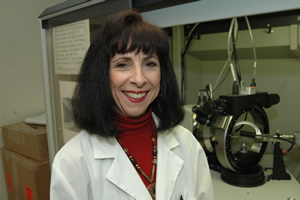Crystallographer Wins Andreoli Award
Kantardjieff Honored for Contributions to Biotechnology
January 20, 2009
By Russ L. Hudson

Katherine Kantardjieff
Cal State Fullerton chemist and protein crystallagrapher Katherine Kantardjieff has been honored with the Andreoli Faculty Service Award, the highest honor for faculty given by the California State University Program for Education in Research and Biology (CSUPERB). Kantardjieff, who joined the campus 20 years ago this month, was honored last week.
Stephen Weber, chair of the CSUPERB President’s Commission and San Diego State University president, presented the award at the program's annual Biotech Symposium at the Marriott Los Angeles Airport. The annual symposia began in 1988 as a forum for students and faculty to present their research; to share ideas on technology, research, science education and best practices; and to honor achievements.
The award honors a Cal State faculty member who has made outstanding contributions to the development of biotechnology programs in the university system. It is named for Anthony Andreoli of Cal State Los Angeles, who said he believes the CSU has a special role to play in higher education by providing opportunities for a large population of nontraditional students who otherwise would have fewer options for advancement.
“Dr. Kantardjieff is one of the most energetic and open-minded persons I know. I very much appreciate her positive influence on my career as a teacher and a researcher. Since she reaches out to all her colleagues at other institutions … she thereby enhances research and teaching in the field of biotechnology across the CSU system and beyond,” said Monika Sommerhalter, assistant professor of chemistry and biochemistry at Cal State East Bay — just one of several comments of support received from peers at Cal State Fullerton, California Institute of Technology, Illinois State, Stanford University and Cal State Channel Islands.
Two Decades of Experience
Perseverance was a factor in winning the award, said the professor of chemistry and biochemistry. “When I started at Cal State Fullerton as a protein crystallographer 20 years ago almost to the day, none of the things here now existed, like CMolS (the W.M. Keck Foundation Center for Molecular Structure).
“With the help of Glenn Nagel, who helped to build the department of chemistry and biochemistry and, as department chair at that time, supported crystallographic research, CMolS is now a core facility for CSUPERB and the Science Teaching and Research Brings Undergraduate Research Strengths Through Technology-Cyber Diffraction Consortium (STaRBURSTT-CDC).“
STaRBURSTT members include predominantly undergraduate institutions, community colleges, historically black colleges and universities, Hispanic-serving institutions and tribal colleges, Kantardjieff said. ”We also collaborate closely with a range of affiliate members, such as doctorate-granting universities, government labs, nonprofit organizations and various companies.
The Keck Center, said the researcher, “includes a comprehensive X-ray diffraction facility and a computational laboratory that is remotely available via the Internet to all 23 CSU campuses. It went online 12 years ago to be available to other campuses. I believe that when the other campuses gained access to the technology, they saw that they, too, could establish a crystallography curriculum and research programs, and it spread from there.”
The genesis of her newest project, the California Partnership for Remote Instruments to Study the Structure of Matter, or Cal-PRISSM, lies in the success of the Keck Center, Kantardjieff said. A number of universities with high-tech instruments formed the PRISSM consortium, sharing with and supporting each other, as well as offering remote use via the Internet to several high schools, community colleges, intermediate schools and researchers at other universities.
In her letter of support to the Andreoli committee, Maria Linder, chair and professor of chemistry and biochemistry, said she speaks for a number of faculty in her own and other departments at Cal State Fullerton — as well as other CSU campuses — when she says, “in our view, Katherine is an ideal candidate for this award in that a large part of her energy over the years has been devoted to furthering intra- and intercampus research collaborations within the area of biotechnology, particularly related to drug discovery and protein structure and function studies.…
“Katherine not only has devoted immense energy to developing and maintaining state-of-the-art molecular structure research capabilities to aid her colleagues and their students with their work, but she has made significant contributions to her field and greatly facilitated programs in education and biotechnology.”
In July 2008, Kantardjieff was named one of 14 Campus Technology Innovators for 2008 by Campus Technology Magazine. The award recognizes those named for their “unique ability to advance teaching, learning, administration and operations on North American college and university campuses,” according to the magazine’s web site. She is vice chair of the Stanford Synchrotron Radiation Laboratory Users Organization Executive Committee and chair of the U.S. National Committee for Crystallography.
Kantardjieff received her master’s and doctorate degrees in physical chemistry from UCLA, where she conducted postdoctoral research on structural biology. She has brought in nearly $2 million in grants to Cal State Fullerton, including funds from the National Science Foundation, National Institutes of Health, Boeing Co., Camille and Henry Dreyfus Foundation, W.M. Keck Foundation and Hampton Research. She has more than 40 articles on research published in peer-reviewed journals and has supervised a dozen master’s theses.

